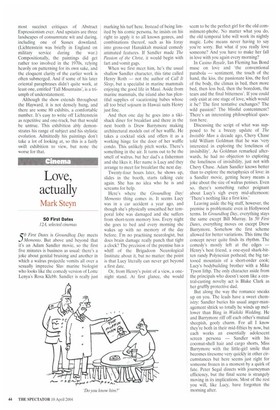Love, actually
Mark Steyn 50 First Dates 12A, selected cinemas c0 First Dates is Groundhog Day meets Memento. But above and beyond that it's an Adam Sandler movie, so the first five minutes is business as usual: there's a joke about genital bruising and another in which a walrus projectile vomits all over a sexually imprecise Slav marine biologist who looks like the comedy version of Lotte Lenya's Rosa Klebb. Sandler is really just marking his turf here. Instead of being limited by his comic persona, he insists on his right to apply it to all known genres, and combinations thereof, such as his foray into gross-out Hanukkah musical comedy animated features. If Sandler made The Passion of the Christ, it would begin with fart and vomit gags.
When we first meet him, he's the usual shallow Sandler character, this time called Henry Roth — not the author of Call It Sleep, but a specialist in marine mammals enjoying the good life in Maui. Aside from marine mammals, the island also has plentiful supplies of vacationing babes whose all too brief sojourn in Hawaii suits Henry just fine.
And then one day he goes into a tikishack diner for breakfast and there in the next booth is Drew Barrymore making architectural models out of her waffle. He takes a cocktail stick and offers it as a working hinge for the door of her waffle condo. This unlikely pitch works. There's something in the air. It turns out to be the smell of walrus, but her dad's a fisherman and she likes it. Her name is Lucy and they arrange to meet for breakfast the next day.
Twenty-four hours later, he shows up, slides in the booth, starts talking cute again. She has no idea who he is and screams for help.
Here's where the Groundhog Day/ Memento thing comes in. It seems Lucy was in a car accident a year ago, and though she's physically unscathed her temporal lobe was damaged and she suffers from short-term memory loss. Every night she goes to bed and every morning she wakes up with no memory of the day before. I'm no practising neurologist, but does brain damage really punch that tight a clock? The precision of the premise has a whiff of the Brigadoon Neurological Institute about it, but no matter: the point is that Lucy literally can never get beyond a first date.
Or, from Henry's point of a view, a onenight stand. At first glance, she would
seem to be the perfect girl for the old commitment-phobe. No matter what you do, the old temporal lobe will work its nightly magic. Lobe means never having to say you're sorry. But what if you really love someone? And you have to make her fall in love with you again every morning?
In Casino Royale, Ian Fleming has Bond muse on love and 'the conventional parabola — sentiment, the touch of the hand, the kiss, the passionate kiss, the feel of the body, the climax in bed, then more bed, then less bed, then the boredom, the tears and the final bitterness'. If you could only exist at one stage of love, which would it be? The first tentative exchanges? The wild passion? The blissful contentment? There's an interesting philosophical question here.
Discussing the script of what was supposed to be a breezy update of The Invisible Man a decade ago, Chevy Chase told William Goldman that he was 'very interested in exploring the loneliness of invisibility'. As Goldman remarked afterwards, he had no objection to exploring the loneliness of invisibility, just not with Chevy Chase. Adam Sandler knows better than to explore the metaphysics of love: in a Sandler movie, getting heavy means a joke about the size of walrus penises. Even so, there's something rather poignant about Lucy's sigh every mid-afternoon; 'There's nothing like a first kiss.'
Leaving aside the big stuff, however, the premise is problematic even in Hollywood terms. In Groundhog Day, everything stays the same except Bill Murray. In 50 First Dates, everything moves on except Drew Barrymore. Somehow the first scheme allowed for better variations. This time the concept never quite finds its rhythm. The comedy's mostly left at the edges — Henry's best friend, a one-eyed shark-bitten randy Polynesian pothead; the big tattooed mountain of a short-order cook; Lucy's bodybuilding brother with a Mike Tyson lithp. The only character aside from the principals who doesn't seem like a central-casting novelty act is Blake Clark as her gruffly protective dad.
But along the way the romance sneaks up on you. The leads have a sweet chemistry: Sandler buries his usual anger-management shtick so totally he winds up mellower than Bing in Waikiki Wedding. He and Barrymore riff off each other's mutual sheepish, goofy charm. For all I know they're both in their mid-fifties by now, but each works an essentially adolescent screen persona — Sandler with his coconut-shell hair and cargo shorts, Miss Barrymore with the little-girl smile that becomes tiresome very quickly in other circumstances but here seems just right for someone frozen in a moment by a quirk of fate. Peter Segal directs with journeyman efficiency, but the final scene is strangely moving in its implications. Most of the rest you will, like Lucy, have forgotten the I morning after.


































































 Previous page
Previous page